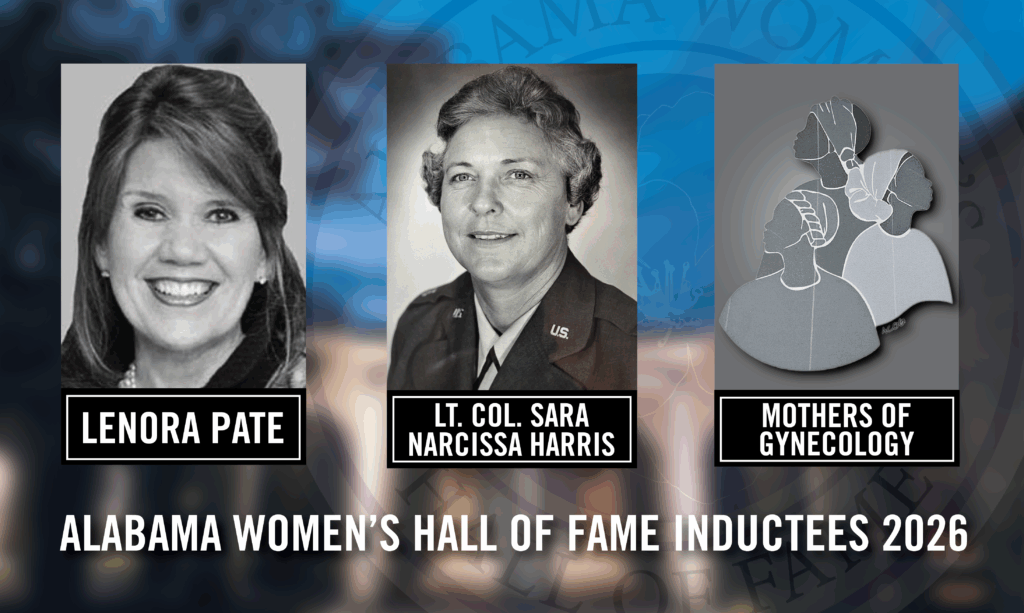Story: Lisa Sollie

State and military leaders join Mothers of Gynecology among newest honorees
The Alabama Women’s Hall of Fame will induct its three newest members during a ceremony on Thursday, March 5, at 11:00 a.m. in the Bridges Auditorium of Wallace Hall on the campus of the University of West Alabama. Former attorney and advocate Lenora Pate, former Lt. Col. Sara Narcissa Harris, USAF (Ret.) and the collective known as the Mothers of Gynecology will be honored for their remarkable contributions to Alabama’s political, legal, military, and social history, marking pivotal milestones in their respective fields.
Lenora Pate
Lenora Pate made history in Alabama politics in 1994 when she was appointed to former Governor Jim Folson’s cabinet, becoming the first woman to serve as director of the Department of Industrial Relations. In 1998, she ran for Governor of Alabama, becoming the first woman to do so since Lurlene B. Wallace in the 1960s.
Born and raised in Inglenook in north Birmingham, Pate graduated as salutatorian from Samford University’s Cumberland School of Law in 1985 while raising two children as a single mother. She began her legal career at Sirote and Permutt (now Dentons), where she practiced with distinction for more than 35 years. Her numerous honors include being named Best Lawyers Health Care Lawyer of the Year in 2016 and 2021, and recognition as a Best Lawyer in America for Health Care Law for 14 consecutive years (2007-2021).
In 2017, Pate received the American Cancer Society’s St. George National Award for her advocacy in successfully advancing anti-smoking ordinances. She also played an integral role in the development of UAB’s Kirklin Clinic, working closely with John Kirklin and the broader medical community to help shape the organization and lay a foundation for its growth.
Pate died in 2021 at the age of 72.
Lt. Col. Sara Narcissa Harris
Born in Possum Bend, Alabama, the fourth of five children, Sara Narcissa Harris graduated with honors from Montevallo College (now the University of Montevallo) in 1942. After a brief period working in the civilian sector, including at the Wilcox Progressive Era newspaper, Harris began a distinguished military career.
Harris enlisted when women were permitted to serve under the Women’s Army Auxiliary Corps (WAAC), and later in the Women’s Army Corps (WAC). As women’s roles evolved from WAC to the Women’s Air Force and ultimately the United States Air Force, Harris rose through the ranks, serving her country during World War II, the Korean War and later in the Vietnam War. She made history as the first female Base Commander in a combat zone, serving as Base Executive Commander of Tan San Nhut Air Force base in Saigon.
Among her many awards are the National Defense Service Medal, Air Force Reserve Service Medal, Air Force Unit Award, Air Force Longevity Service Award, Vietnam Service Medal, and the Bronze Star Medal. Upon her retirement in 1968, Harris was recognized as America’s most decorated female service member.
After retiring, Harris returned to Possum Bend and to Liberty Hall, the family home acquired in 1925. She led restoration efforts that resulted in the home’s placement on the National Register of Historical Places in 1984 and helped organize the Wilcox Historical Society, remaining an active advocate for preservation in the county.
Harris died in 2022 at the age of 102.
Mothers of Gynecology
Part of the Alabama Fistula Experiments conducted in Montgomery between 1845 and 1857, the Mothers of Gynecology—Anarcha, Betsey, Lucy, and other women named and unnamed—represent a legacy of resilience, sacrifice, and long-unacknowledged contribution to the advancement of modern gynecology.
These experiments used young, enslaved women in attempts to repair obstetric fistulas, a devasting childbirth injury that causes chronic infections, social stigma, emotional distress, and severe reductions in quality of life. Though these women endured profound physical and emotional trauma, their suffering became the foundation upon which modern gynecology was built.
As a means of survival, fistulous women created a patient-centered model of care rooted in community. During prolonged recovery periods, they learned to care for one another, and many went on to serve as nurses, nurse’s aides, even surgical assistants. This model of care has since been emulated in fistula clinics across Africa and the developing world. Their legacy lies not in what they chose, but in what they endured—and in how their experiences have fueled ongoing movements for medical ethics, racial justice, communal care, and recognition of Black women’s contributions to science and society.
Alabama Women’s Hall of Fame
Established in 1970, the Alabama Women’s Hall of Fame honors the lives of outstanding women from across the state. Inductees must be deceased for at least two years, be from or affiliated with Alabama, and be selected by unanimous vote of the Hall’s board of directors. Relocated to the University of West Alabama in 2021, the Hall of Fame continues to celebrate Alabama women whose achievements have shaped the state and nation.
Event Details
The ceremony is open to the public, and admission is free. Tickets for a luncheon following the ceremony at UWA’s Bell Conference Center are available for $50. The deadline for luncheon reservations is February 28. For tickets or more information, contact Dr. Valerie Pope Burnes, University of West Alabama history professor and executive secretary of the Alabama Women’s Hall of Fame, at vburnes@uwa.edu or at (205) 652-3856.